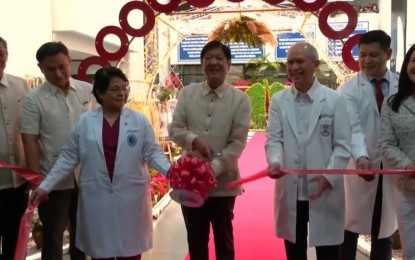
LUNG TRANSPLANT PROGRAM. President Ferdinand R. Marcos Jr. on Tuesday (Jan. 23, 2024) leads the official launching of the Lung Transplant Program of the Lung Center of the Philippines and the National Kidney and Transplant Institute in Diliman, Quezon City. During the event, Marcos said the government is eyeing to establish an additional 179 medical specialty centers by 2028. (Screenshot from Radio Television Malacañang)
MANILA – The government is eyeing to establish an additional 179 medical specialty centers by 2028, President Ferdinand R. Marcos Jr. said on Tuesday.
During the launching of the country’s first human lung transplant of the Lung Center of the Philippines (LCP) and the National Kidney and Transplant Institute (NKTI) in Diliman, Quezon City, Marcos said seven of the 179 specialty centers that will be built are dedicated for lung care.
“It is the same grand vision which prompted the establishment of the LCP, and the NKTI, and the Heart Center, during an era when great things were not only dreamed of but developed. ‘Build, Better More’ is of the same ethos which should animate us today, to march forward, instead of just running in place,” he said.
Marcos stressed that through Republic Act 11959 or the Regional Specialty Centers Act, around 131 functional specialty centers have already been built nationwide, nine of which are designated as lung specialty centers to bring lung care closer to Filipinos, particularly in the rural areas.
He said the government also continues conducting training for doctors through the “Doctors to the Barrios Program,” adding that their development is critical to the realization of universal healthcare.
He added the Commission on Higher Education (CHED) and the Department of Health (DOH) are also implementing an expanded nursing education program to address the shortage of healthcare workers while ensuring their future supply.
“Let us remember that healthcare is our covenant with the people, a public commitment driven by neither political agenda nor personal legacy projects,” Marcos said.
Marcos lauded the healthcare workers for their unwavering commitment to the healthcare system, to the Filipino people and the country, especially during the height of coronavirus disease 2019 pandemic.
“Nais naming ipaabot ang aming taus-pusong pasasalamat dahil sa inyong katapangan (We want to extend our heartfelt gratitude for your bravery). Your gallant acts do not fade with time, then gratitude has no expiry date either,” he said.
NKTI rehab
Marcos also vowed to exhaust all efforts to rehabilitate the NKTI Annex building following a fire that gutted the LCP in 1998.
A fire that broke out at the LCP in May 1998 affected the nearby NKTI Annex building housing the emergency room, wards, operating room and radiology complex.
“We will be coming to you again so that we can complete, we can complete the rebuilding. I was a little sad to hear that the damage that was caused by the fire of 1998 has not yet been completely rehabilitated, and I think that’s the first thing that we have to look at,” Marcos said.
“And, it seems like it has been too long a delay to wait since 1998 to bring us back to the standards, or at least the capacity that we had in 1998 to now, which is already 2024. So, we are playing catch-up, but we will do all that we can,” he added.
The five-year LCP-NKTI Lung Transplant Program, initiated in November 2022, aims to develop a lung transplant manual that addresses barriers such as lack of infrastructure and organ donation and allocation system, limited access to trained personnel, and financial constraints.
As part of the program, the LCP has been improving its infrastructure capacity, including the renovation of its post-anesthesia care unit worth PHP4.2 million, and surgical intensive care unit amounting to PHP1.8 million which will be funded through the 2024 General Appropriations Act and private sector donations.
The LCP was created in 1981 by virtue of Presidential Decree (PD) 1823 as a tertiary level state-owned hospital that aims to address the respiratory health problems in the country.
On the other hand, the NKTI, formerly the National Kidney Foundation of the Philippines, is a tertiary medical specialty center created in 1981 through PD 1832. Its mission is to serve, train personnel, and conduct research for the benefit of Filipinos afflicted with kidney and similar diseases. (PNA)
